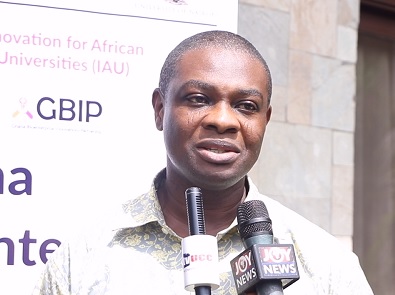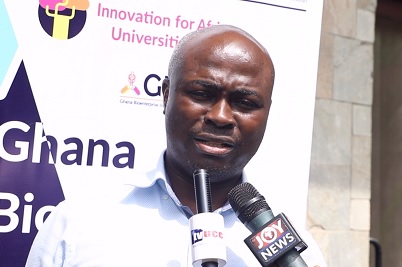The Dean of the School of Allied Health Sciences at the University of Cape Coast, Prof. Desmond Omane Acheampong has called for strategies to translate research findings into marketable products.
According to him, when it comes to innovation and entrepreneurship in the field of health sciences, Ghana is lagging behind the rest of the world due to the fact that commercial values are not added to results of various researches that are always undertaken.
Speaking to ATLFMNEWS and TVUCC on the sidelines of a stakeholder engagement to disseminate a needs-based survey among bioscientists and students in a cross-section of universities in Ghana, he said researches should be able to solve problems in society.
He said researches must not be done and kept on the shelves but rather “we do research and be able to translate them into market products”.

Prof. Omane Acheampong, who is also the co-principal investigator for the project said the team is seeking to coming out with a manual that will help student-scientists translate their findings into marketable products.
On his part, Dr. Stephen Moore of the Department of Mathematics and a member of the Research team urged lecturers to be innovative in setting the right exams for students in order to get enough time to embark on research activities.
He said often time, lecturers use their time in marking exam papers, setting questions and attending to student problems resulting in less time for them to think about innovative ways to channel their ideas to the market.
Curriculum development
He further indicated that innovation in curriculum development can reduce the time for lecturers to also have more time to do research and to head towards the market.

On the next phase of the project, he said, the team is going to develop a blueprint for how students and lecturers can come out with innovative ideas and be guided on what steps to take to bring their ideas to fruition.
Meanwhile, the in-coming Pro-Vice Chancellor of the University of Cape Coast, Prof. (Mrs.) Rosemond Boohene in a remark stated that the university has responded to issues of unemployment in the country by incorporating entrepreneurship and entrepreneurial activities into its programmes although there is more to be done.
GBIP
To strengthen the capacity of universities to participate and provide meaningful contributions as key players within the entrepreneurship ecosystem in their respective regions thereby increasing student-graduate employability, the British Council Innovation for African Universities is sponsoring a 15-month Ghana Bioenterprise Innovations Partnership between three universities.
They are the University of St. Andrews in Scotland being the lead University, the University of Health and Allied Sciences at Ho as the Sub-Saharan African University and the University of Cape Coast as the Ecosystem Player.
The project, titled St. Andrews-Ghana partnership to foster biomedical research enterprise for better health and wellbeing is to develop knowledge and exchange mentorship programme to equip young bioscientists in Ghana with the knowhow to translate biomedical research into commercial solutions.
Source: Anthony Sasu Ayisadu/ ATLFMNEWS


























